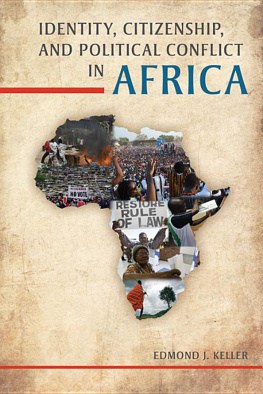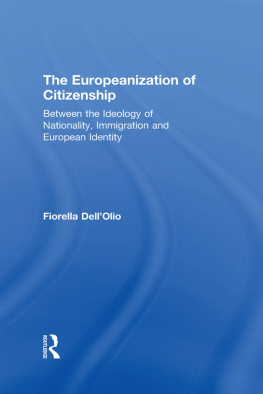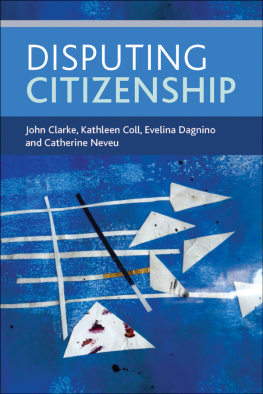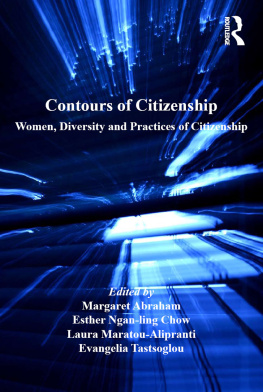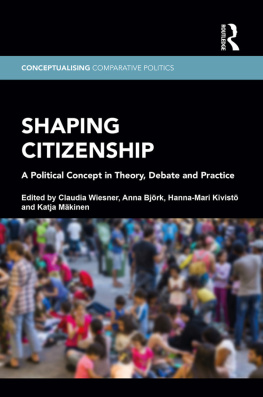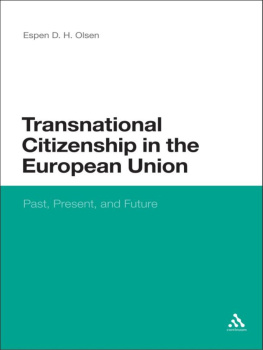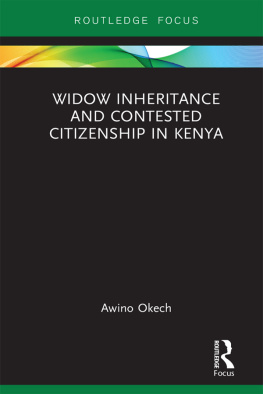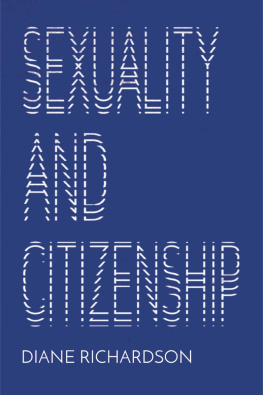First published 2015 by Ashgate Publishing
Published 2016 by Routledge
2 Park Square, Milton Park, Abingdon, Oxon OX14 4RN
711 Third Avenue, New York, NY 10017, USA
Routledge is an imprint of the Taylor & Francis Group, an informa business
Copyright Samantha Balaton-Chrimes 2015
Samantha Balaton-Chrimes has asserted her right under the Copyright, Designs and Patents Act, 1988, to be identified as the author of this work.
All rights reserved. No part of this book may be reprinted or reproduced or utilised in any form or by any electronic, mechanical, or other means, now known or hereafter invented, including photocopying and recording, or in any information storage or retrieval system, without permission in writing from the publishers.
Notice:
Product or corporate names may be trademarks or registered trademarks, and are used only for identification and explanation without intent to infringe.
British Library Cataloguing in Publication Data
A catalogue record for this book is available from the British Library
The Library of Congress has cataloged the printed edition as follows:
Balaton-Chrimes, Samantha.
Ethnicity, democracy and citizenship in Africa : political marginalisation of Kenyas Nubians / by Samantha Balaton-Chrimes.
pages cm. (Contemporary african politics)
Includes bibliographical references and index.
ISBN 978-1-4724-4066-2 (hardback) ISBN 978-1-3155-8051-7 (ebook) ISBN 978-1-3171-4079-5 (epub) 1. Citizenship Kenya History 21st century. 2. Ethnicity Kenya History 21st century. 3. Democracy Kenya History 21st century. 4. Nubians Kenya Social conditions. I. Title.
JQ2947.A92B35 2015
323.119650669dc23
2014033748
ISBN 9781472440662 (hbk)
ISBN 9781315580517 (ebk-PDF)
ISBN 9781317140795 (ebk-ePUB)
Series Editors Preface
Once seen only as a continent of poverty, violence and corruption, the Africa of today is a vibrant place where social forces demand representative governance, in the process generating fresh forms of complexities in the political, social and economic life of ordinary Africans. Whether what we are witnessing is a third liberation of the continent: the first from colonialism, the second from autocratic indigenous rule and now something far more different, is a work in progress.
This series seeks original approaches to furthering our understanding of the ensuing changes on the continent. The series includes work that progresses comparative analysis of African politics. It looks at the full range and variety of African politics in the twenty-first century covering the changing nature of African society, gender issues, economic prosperity and poverty to the development of relations between African states, external organisations and between leaders and the people they would govern. The series aims to publish work by senior scholars as well as the best new researchers and features original research monographs, thematically strong edited collections and specialised texts.
Nana K. Poku,
Health Economics and AIDS Research Division (HEARD),
South Africa
Acknowledgements
First and foremost my utmost gratitude goes to the many people who participated in my research in Kenya. I am humbled by the generosity of time, information and spirit that I encountered within the Nubian communities in Kibera, Eldama Ravine, Nakuru, Kericho, Kibos and Kisii. In particular I owe a great debt to Rajab Bilale Osman and Hassan S. Abdallah for their friendship and guidance. My most profound and sincere hope for this book is that it meets your expectations. Special thanks to Yusuf Ibrahim Diab, Issa Abdul Faraj, Ibrahim Athman and the Kenyan Nubian Council of Elders; to Jamaldin Yahya; to the Kibra Land Committee; to Ismail Ramadhan and Community Rights Forum of Kibera; and to Zidu Guwa, the Youth Reform Self Help Group, Beledia Nubi, the Haiba foundation and the Nubian Youth Consortium for receiving me into your community and guiding my way. Very special thanks to Adam Hussein Adam at the Open Society Initiative in Eastern Africa, without whom I could never have got this project off the ground; and to Korir SingOei of CEMIRIDE (among other initiatives and roles), without whom this book would contain many more errors.
I owe sincere and earnest thankfulness to Paul Muldoon and Michael Janover, who were wonderful intellectual interlocutors throughout this process, and without whom writing this book would not have been nearly as satisfying or rewarding.
I am obliged to many of my colleagues who supported me in various ways throughout the course of this research, including Simon Adams, Brad Blitz, Scott Brenton, Denise Cuthbert, Greg Constantine, Graeme Counsel, Johan de Smedt, Peter Geschiere, Fiona Haines, Geoffrey Hawker, Paul James, Douglas Johnson, Adrian Little, Gabrielle Lynch, Maureen Lynch, Bronwen Manby, Kate Macdonald, Terry Macdonald, Shelley Marshall and Matt Tomlinson. I am particularly indebted to David Anderson at the Oxford African Studies Centre for hosting me as a Visiting Student for the 2011 Trinity term. In Kenya, my thanks go to Ambreena Manji and the British Institute in Eastern Africa for guiding me through the challenges of obtaining research permission in Kenya; and to Antoinette Kankindi and Wambui Kariuki for the helpful and fruitful affiliation with the Strathmore Governance Centre.
This project would not have been possible without the financial support of the Centre for Citizenship and Globalisation at Deakin University, and the Layne Beachley Aim for the Stars Foundation, for which I am extremely grateful. Similarly, I am appreciative of the invaluable administrative support of Sue Stevenson, Gayle Whyte, Anna Davis, David Bell, Colin Rose, the staff at the Matheson, Baillieu, Bodleian and Deakin libraries, and the staff at the Kenya National Archives. Many thanks also to Muchiri for the Kiswahili lessons.
For their extraordinary friendship, personal and intellectual support, and their tolerance of my constant distraction, thanks to James Clinch, Greg Deacon, Sophie de Feyter, Christina Kenny, Tanya Lyons, Kudzai Matereke, Kate McGannon, Cameron Nolan, Michelle Osborn, Caitlin Wilks, and my family. Extra special thanks to Debra Smith and Kiran Pienaar for positively every kind of support imaginable.
Thanks to Penny Farthing Espresso and the Brunswick East Project for all the coffee and desk space.
Special thanks to Rob Sorsby and the very helpful editorial and production teams at Ashgate.
And finally, my most profound thanks to Andrew Stapleton, who sits next to me as I write this and who has been cracking me up, propping me up, editing and indexing through the longest and hardest parts of this project.
This rather long list is testament to the extent to which this work is not mine alone, though I take full responsibility for any of its flaws.
An earlier version of have been published as Indigeneity and Kenyas Nubians: seeking equality in difference or sameness?, Journal of Modern African Studies, 51(2) (2013): 33154 and Counting as citizens: The case of the Nubians in the 2009 Kenyan census, Ethnopolitics



